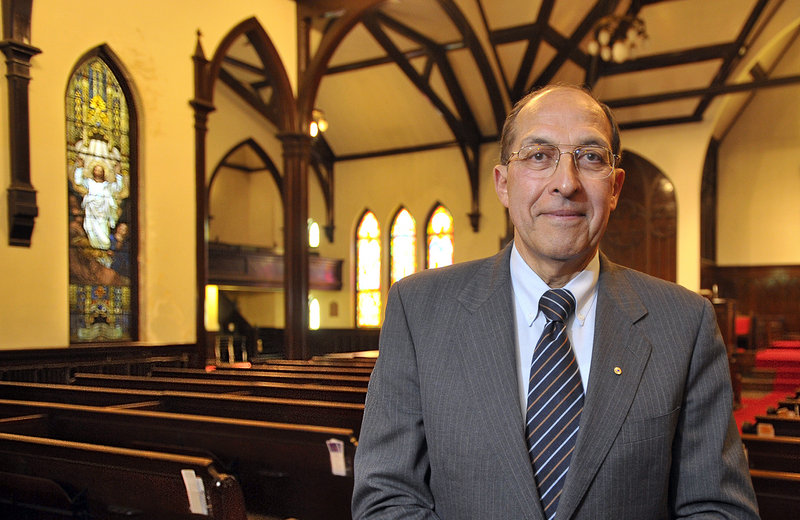PORTLAND — A board member of the Williston-West United Church of Christ on Tuesday apologized to West End residents for selling the church to a businessman who wants to use the first floor of the attached parish house for office space.
Frank Monsour, the Australian businessman who bought the church, said he never meant to mislead anyone, and that the board member must have misunderstood him.
Peter Murray, a member of the nine-member church board, told city planners Tuesday that he was misled by Monsour, who bought the church in December for $657,000. Monsour is now seeking a zoning change that would allow up to 14 people to work in the parish house.
Murray said Monsour told him in a phone call late last fall that his family would use the parish house as a residence when visiting the United States. Murray said Monsour never said anything about plans to use the first floor as office space for the American headquarters of his small, startup software development company, Majella Global Technologies.
“We who precipitated the crisis on our neighbors, we feel terrible,” said Murray, who lives in the neighborhood on West Street. “I am so, so sorry that happened.”
But Monsour said he never misled Murray during the two-hour, international phone call that included two brokers and another church board member. Perhaps church members misheard or misunderstood him, he told the Portland Planning Board.
“We did not intend to deceive them,” he said.
If the church leaders feel so strongly that the sale was a mistake, he added, he would be willing to discuss selling the church back to them.
Williston-West United Church of Christ has merged with another church and moved its services to High Street.
Edward Herczeg, the broker who worked for Monsour, said in an interview that church leaders knew Monsour wanted a zoning change to allow for office space because Monsour had requested that zoning approval be a condition of the purchase. The church board refused, Herczeg said.
Moreover, the board insisted as a condition of the sale that the organ and stained-glass windows in the sanctuary be returned to the congregation if Monsour demolished the building, Herczeg said.
Monsour told planners that he wants to preserve the church’s historic sanctuary as a “living monument” for public use, such as concerts for string quartets.
He said that gutting the sanctuary and filling it with multiple condominium units – an idea being pushed by many neighbors – is anathema to preservation stewardship as practiced in Australia, where he has restored an historic building in Brisbane.
Monsour said the plans for office space in the parish house would underwrite the cost of restoring the structure, which he estimated at close to $1 million. He plans to replace an asphalt roof with a pea-green slate roof, its original color.
Built in 1877, the sanctuary was designed by Francis Fassett, a prominent architect. In 1904, John Calvin Stevens, Portland’s most famous architect, built the parish house. The church is on the National Registry of Historic Places.
“All I hear today are neighborhood issues, not community-at-large issues, Monsour said, following testimony from nearly 30 people, mostly West End residents. The testimony was about evenly divided between supporters and opponents.
Supporters said the project is the best hope for preserving the sanctuary, which has a leaking roof that is causing damage. Converting the structure into condominiums would be impractical because it would be expensive and require significant alterations that would harm its historic integrity.
Because the building is unique and architecturally important, Monsour’s plan deserves consideration by the city, said Hilary Bassett of Greater Portland Landmarks. She said her organization generally supports the zoning change but recommends some adjustments, such as obtaining a written agreement spelling out all aspects of the rehabilitation work so there is no ambiguity.
The church is located in a residential zone in the middle of the Western Promenade, the city’s most prestigious neighborhood. Opponents said that allowing office space in the church would set a precedent and allow more businesses to move into the neighborhood.
Monsour will reap an economic windfall if the city grants the zoning change because the property value will increase, said Orlando Delogu, a former Planning Board member. He said Monsour’s success would encourage other developers to take the same route, creating instability in the city’s zoning rules.
Planning Board member David Silk said he is “struggling” with the zoning change request because the current zoning explicitly states that there be no commercial uses in the zone. Overriding the prohibition would be a policy decision ultimately made by the City Council, which has the final say on the matter.
Planning Board Chairwoman Carol Morrissette seemed to support the proposal. She said it wouldn’t set a precedent because it’s a one-of-kind building, and that opponents need to make a stronger case for how 14 office workers would harm neighbors’ quality of life and property values.
“I need more information about how 14 people who don’t park on the street can destroy a neighborhood,” she said. “I just don’t get it.”
The Planning Board is tentatively scheduled May 22 to hold a public hearing and vote on a recommendation to the City Council.
Staff Writer Tom Bell can be contacted at 791-6369 or at: tbell@pressherald.com
Twitter: TomBellPortland
Send questions/comments to the editors.



Success. Please wait for the page to reload. If the page does not reload within 5 seconds, please refresh the page.
Enter your email and password to access comments.
Hi, to comment on stories you must . This profile is in addition to your subscription and website login.
Already have a commenting profile? .
Invalid username/password.
Please check your email to confirm and complete your registration.
Only subscribers are eligible to post comments. Please subscribe or login first for digital access. Here’s why.
Use the form below to reset your password. When you've submitted your account email, we will send an email with a reset code.